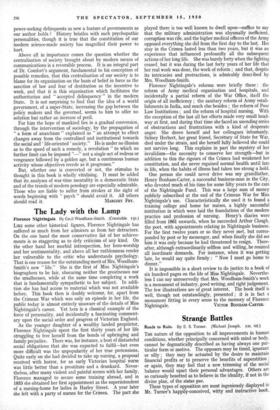The Lady with the Lamp
Florence Nightingale. By Cecil Woodham-Smith. (Constable. x 5s.)
Lira some other historical figures, Florence Nightingale has suffered as much from her admirers as from her detractors. On the one hand the most conservative list of her achieve- ments is so staggering as to defy criticism of any kind. On the other hand her morbid introspection, her hero-worship and her sentimentality, and above all her ruthlessness render her vulnerable to the critic who understands psychology. That is one reason for the outstanding merit of Mrs. Woodham- Smith's new "life." She is the first of Miss Nightingale's biographers to be fair, obscuring neither the greatnesses nor the smallnesses, while at the same time completing a work that is fundamentally sympathetic to her subject. In addi- tion she has had access to material which was not available before. This book then is doubly welcome, for, apart from the Crimean War which was only an episode in her life, the public today is almost entirely unaware of the details of Miss Nightingale's career. Yet hers is a classical example of the force of personality, and incidentally a fascinating comment- ary upon the social order and_progress of Victorian England. As the younger daughter of a wealthy landed proprietor, Florence Nightingale spent the first thirty years of her life struggling to free herself from the bonds of upbringing and family prejudice. There was, for instance, a host of distasteful social obligations that she was expected to fulfil—but even more difficult was the unpopularity of her true pretensions. Quite early on she had decided to take up nursing, a proposal received with horror, for an early Victorian hospital nurse was little better than a prostitute and a drunkard. Never- theless, after many violent and painful scenes with her family, Florence managed to secure some training abroad, and in 1853 she obtained her first appointment as the superintendent of a nursing-home for ladies in Harley Street. A year later she left with a party of nurses for the Crimea. The part she played there is too well known to dwell upon—suffice to say that the military administration was abysmally inefficient, corruption was rife, and the higher medial officers of the Army opposed everything she did from the first day to the last. Her stay in the Crimea lasted less than two years, but it Was an experience that influenced profoundly all the subsequent actions of her long life. She was barely forty when the fighting ceased, but it was during the last forty years of her life that her real work was done, the work of reform ; and that, despite its intricacies and protractions, is admirably described by Mrs. Woodham-Smith.
Florence' Nightingale's reforms were briefly these : the reform of Army medical organisation and hospitals, and incidentally a partial reform of the War Office, itself the origin of all inefficiency ; the sanitary reform of Army estab- lishments in India, and much else besides ; the reform of Poor Law Institutions ; and the reform of hospital nursing. With the exception of the last all her efforts made very small head- way at first, and during thaf time she faced an unending series of obstructions and frustrations with a kind of desperate anger. She drove herself and her colleagues 'inhumanly. Sidney Herbert, her great friend, Secretary of State for War, died under the strain, and she herself fully believed she could not survive long. This explains in part the mystery of her invalidism—the necessity to conserve her strength—but in addition to this the rigours of the Crimea had weakened her constitution, and she never regained normal health until late in life, when the habits of illness had taken too strong a hold.
One person she could never drive was my grandfather, Henry Bonham-Carter, a successful business-man in the City, who devoted much of his time for some fifty years to the care of the Nightingale Fund. This was a large sum of money publicly subscribed at the end of the Crimean War for Miss Nightingale's use. Characteristically she used it to found a training college and home for nurses, a highly successful institution in which were laid the foundations of the modern practice and profession of nursing. Henry's diaries were filled from 1861 onwards, when he succeeded Arthur Clough, the poet, with appointments relating to Nightingale business. For the first twelve years or so they never met, but corres- ponded by post or by messenger, and when finally she did see him it was only because he had threatened to resign. There- after, although extraordinarily selfless and willing, he resisted all inordinate demands. For instance, when it was getting late, he would say quite firmly : "Now I must go home to dinner."
It is impossible in a short review to do justice to a book of six hundred pages on the life of Miss Nightingale. Neverthe- less I can say unreservedly that Mrs. Woodharn-Smith's work is a monument of industry, good writing, and right judgement. The few illustrations are of great interest. The book itself is well, though not outstandingly, presented ; it is in fact a monument fitting in every sense to the memory of Florence






















 Previous page
Previous page